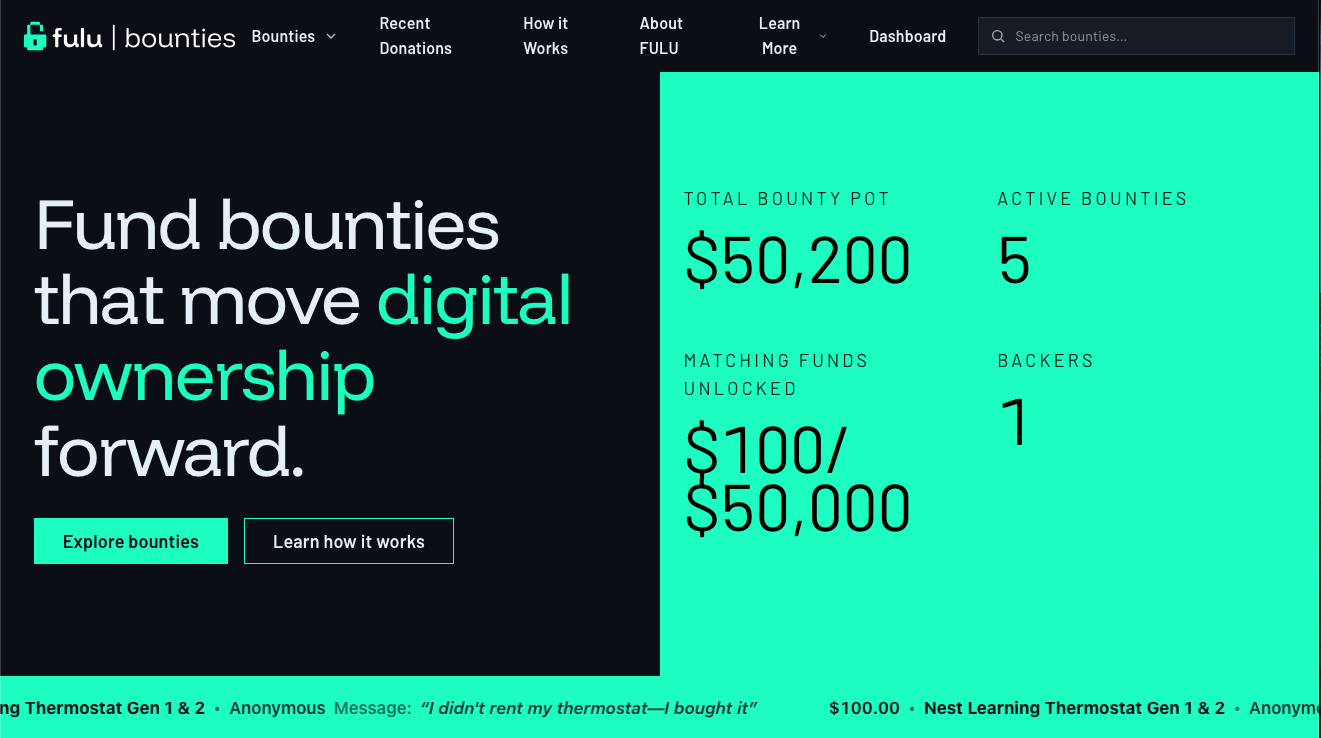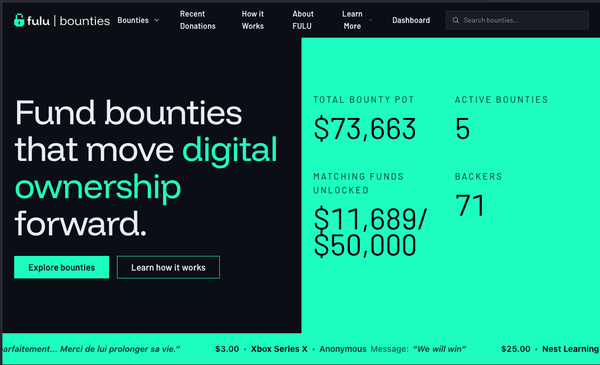RELEASE: First-of-its-kind repair bounty program targets Google Nest, Xbox, more to restore ownership rights

New advocacy group pledges up to $100,000 for software fixes that would give consumers more control
For immediate release: Thursday, October 23, 2025
Media contact: Kevin O’Reilly, FULU Executive Director, kevin@fulu.org, (925) 785-0851
AUSTIN — For consumers, the cost of “smart” products often goes beyond the price tag: It includes giving up some control over the gadgets they bought and own. Device makers increasingly use software to control how an owner uses their product, how long they can use it, and how or if they can fix it. FULU, a new consumer protection group born out of the Right to Repair movement, launched a new bounty program on Thursday that seeks to claw back some of that control for product owners.
“When Americans brought technology into their home, they didn’t realize they were signing over their ownership rights in the process,” said FULU Executive Director Kevin O’Reilly. “It was a bad deal, and it’s not a deal they should have to accept. Our bounty program is all about tipping the scales back toward the consumer.”
Bounties, typically deployed by governments and companies to identify cybersecurity vulnerabilities, are used to recruit independent coders and technologists to identify software bugs and create ways to fix them. Headlining FULU’s list of desired fixes is a way to keep older Nest Learning Thermostats running. Google has announced it will stop providing software support for some models on October 25, which means that product owners will lose the ability to monitor or adjust their thermostat via an app. Consumers will therefor need to either replace their smart device or learn to live with a “dumb” one.
“When I have to be out of the house during the hotter or colder days of the year, I need to be able to make sure that my two elderly dogs don’t get heatstroke or end up freezing. Without the ability to monitor and adjust my thermostat remotely, I’m cooked,” said Brandtley McMinn, a 2nd Gen Nest thermostat owner in Austin, TX. “My thermostat is a perfectly good piece of hardware. Why should I have to replace it when other software would allow me to keep it running?”
There are open-source software alternatives, such as Home Assistant, that provide users with smart features similar to those offered by Nest. Unfortunately for consumers, digital locks built into the thermostats’ software prevent them from installing or integrating those alternatives.Similar digital locks are at the heart of the other problems that FULU is targeting with its bounty program. For example, digital locks prevent Samsung smart fridge owners from turning off unwanted advertisements recently pushed by the company, just as they force Xbox-playing gamers to take unnecessary steps to fix their consoles. Coders that develop solutions to these or any of the five bounties listed will win awards of up to $20,000 from FULU. The platform also allows the public to donate to the products for which they most want to see a fix.
Denver Gingerich of the Software Freedom Conservancy (SFC) says that Google should be providing the public with the “complete source code” behind its Nest Thermostats. In developing its thermostat, Nest used software under the GPL, an agreement which requires the company to provide its source code in exchange for use of the free software.
“Nest chose to use software with a built-in right to repair in its thermostats,” said Gingerich, SFC’s Director of Compliance. “But they took those rights away when they locked down the Nest devices and failed to provide the complete source code for Linux, one of those software projects. Owners should already have the right to update and fix their devices as they desire.”
Beyond the technical difficulty of bypassing digital locks, the act itself can be a copyright crime. Congress passed the Digital Millennium Copyright Act (DMCA) in 1998 to prevent piracy in response to the rise of file-sharing software such as Napster. One of it’s provisions, Sec. 1201, outlaws the circumvention of “technological protection measures.” Exemptions have been since been granted for purposes of repair and maintenance, but only for consumers savvy enough to write the code themselves. The tinkerers and innovators who develop repair alternatives to manufacturers’ locked-down methods are prohibited from making them available to the public. That prevents third-party tools from entering the market.
“Technology has changed a lot in the 27 years since Congress passed the DMCA. The law passed then did not predict how prevalent digital devices would be now,” O’Reilly added. “Sec. 1201 is in clear need of a revamp. It’s due time that lawmakers recognized the thing that’s obsolete here is not anyone’s device — it’s the law.”
###
FULU is a nonprofit advocacy organization that advocates for consumers’ right to repair, own and control their technology.




